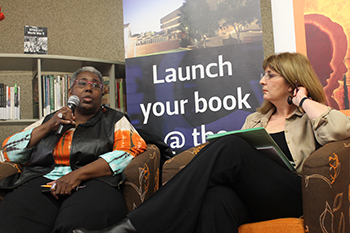Latest News Archive
Please select Category, Year, and then Month to display items
13 August 2024
|
Story Anthony Mthembu
|
Photo Sibahle Dayimani and Amandla Kulu
 Prof Peter Roseel, Managing Director of Management Consulting and Research – a spin-off of the Catholic University of Leuven in Belgium; and Prof Nicolene Barkhuizen, Director of the UFS Business School.
Prof Peter Roseel, Managing Director of Management Consulting and Research – a spin-off of the Catholic University of Leuven in Belgium; and Prof Nicolene Barkhuizen, Director of the UFS Business School.
The Business School at the University of the Free State (UFS) hosted Prof Peter Rosseel, Managing Director of Management Consulting and Research – a spin-off of the Catholic University of Leuven in Belgium – for a guest lecture during his visit to the UFS Faculty of Economic and Management Sciences (EMS).
The guest lecture took place on 19 July 2024 in the Business School Auditorium and was attended by academics from the UFS.
Reflecting on the lecture
The lecture presented by Prof Rosseel focused on how combining strategy, strategy implementation, culture transformation, leadership, and learning successfully leads to sustainable growth, creates engagement, and delivers tangible results. Throughout the lecture, Prof Rosseel spoke about how experts tend to make bad leaders and therefore stop change from happening within an organisation. In fact, he highlighted that, “Experts stop change from happening within the workplace because experts, by definition, look through the eyes of their expertise, but you cannot reduce the world to different forms of expertise, as it is holistic.” As such, he argued that to change an organisation, one must see things from the point of view of others.
Furthermore, Prof Rosseel delved deeper into the hierarchical operating model within organisations. He indicated that the above model should be one community within organisations; however, unfortunately it is not. This is because organisations are made up of several departments such as finance and human resources. As such, he regards these departments to be silos that could prove to be detrimental to organisations, as each silo can create its own culture as opposed to an organisational culture. These are some of the points he discussed throughout the lecture.
After the lecture concluded, the audience had the opportunity to engage with Prof Rosseel on his viewpoints. In fact, Lyle Markham, Academic Head of Department and Lecturer in Industrial Psychology at the UFS, was one of the audience members and described the lecture as insightful.
Africa’s lost voice during the Second World War echoes throughout book
2016-08-24

Prof Judith Byfield and Prof Heidi Hudson at the
book launch of Africa and Second World War at the
UFS Sasol Library.
Photo: Rulanzen Martin
If you pick up any historical record on the Second World War, you would see that, to a large extent, Africa has been missing from the history pages until now.
Africa and the Second World War (WW II) is a book edited by Prof Carolyn Brown from Rutgers University and Prof Judith Byfield from Cornell University in the United States. The book is the outcome of various papers presented during a workshop at Rutgers University and at a conference on WWII hosted at Cornell University.
The co-editors of the book were invited by Prof Jonathan Jansen, Vice-Chancellor and Rector of the University of the Free State (UFS), to launch the book at the UFS. The Centre for Africa Studies at the university, in collaboration with the UFS Sasol Library, presented the launch on Tuesday 16 August 2016.
Bestowing honour upon Africa’s role during WW II
Many people do not know that WW II started in Ethiopia with the Italian Invasion. This is generally omitted from discussions or complete histories of WW II. The present book explores the experiences of male and female combatants, peasant producers, women traders, missionaries, and sex workers during the war. “Many people are not aware that Africa produced most of the mineral and agricultural during the war,” said Prof Brown.
Book to reach a greater audience for discussion
The co-editors hope that the book reaches people who teach WW II history, as many talk about only the nationalist movements. “The opening of the book also talks about the importance of South Africa during WW II,” said Prof Byfield. The authors hope that people will read the book to start thinking comparatively about the war.